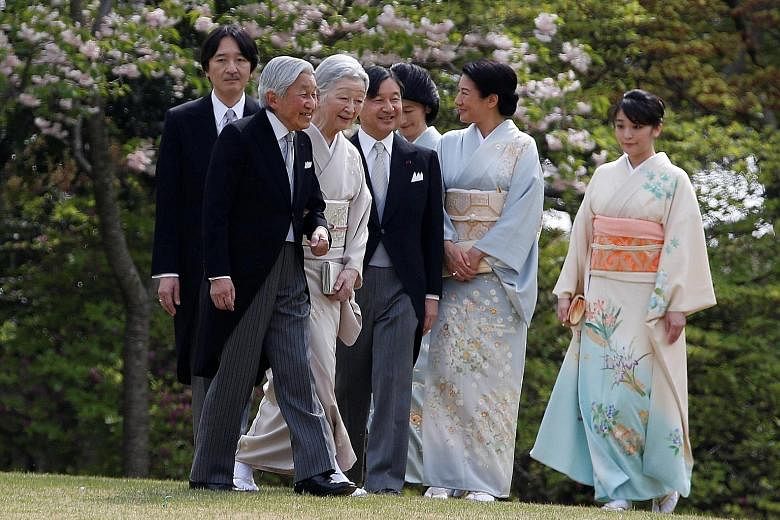The future of the world's oldest imperial bloodline is at risk and this is an issue for which discussions "cannot be postponed", a panel of experts appointed by the Japanese government has warned.
The panel, convened to look into how Emperor Akihito can fulfil his hinted desire to relinquish his throne, said yesterday that this was a pressing issue, given the dwindling number of royals qualified to ascend the Chrysanthemum Throne.
The popular 83-year-old Emperor had, in a rare national address last August, confessed his worries of not being able to adequately fulfil his duties as he gets older, gaining widespread public sympathy.
Under Japan's current Imperial Household Law, the monarch must rule until his death. But a one-off provision is likely to allow Emperor Akihito to abdicate, after the panel yesterday submitted its final report to Prime Minister Shinzo Abe.
The government will use the 43-page report as a basis to table a Bill in the Diet next month, aiming to get it passed as law before the current session closes in June.
Although the panel highlighted the urgency of the threat to the world's oldest hereditary monarchy, said to date back to 660BC, it did not provide any solutions as the issue falls outside its ambit.
But it stressed: "In order for the Emperor to fully perform the role as a symbol of the people and the activities of the imperial family to be maintained, it is necessary to promptly examine counter-measures to cope with the decline in the number of royals."
It added: "We expect discussions on this issue to deepen from hereon within the government and among the Japanese public."
The Imperial Household Law forbids daughters born into the royal family from ascending the throne as a ruling empress, and they lose their royal status upon marriage.
Talks to revise the patriarchal law to allow for female succession have been politically sensitive.
A debate that started in 2005 was quickly abandoned once Prince Hisahito, who is now 10, was born.
Emperor Akihito - Japan's 125th monarch - is widely expected to step down in December next year.
Next in line to the throne is Crown Prince Naruhito, 57, then his brother Prince Akishino, 51, and Hisahito, who is the latter's son.
But there are seven young princesses in the family, including the Crown Prince's only child Aiko, 15.
The panel had, in an interim report released in January, laid out the advantages of a special one-off law to allow Emperor Akihito to step down. It said a permanent system was problematic as it would be difficult to define the necessary conditions for abdication and could lead to political abuse in future.
The Nikkei Asian Review cited sources saying that the proposed Bill would allow Emperor Akihito to abdicate within three years of its passage into law, with the date to be set by a special government decree.
The final report primarily looked into administrative matters, including the Emperor's post-retirement title and role, noting the need to "avoid potentially harmful situations like the appearance of a dual symbolism or dual authority".
If Emperor Akihito does abdicate, he would be the first monarch to relinquish the throne since Emperor Kokaku abdicated in 1817.
In such an event, Emperor Akihito will be referred to as "joko" (Grand Emperor) upon stepping down, the report said. He will also rescind his status as a "symbol of the state and unity of the people".
As such, he should in principle avoid engaging in public duties that could create an impression of dual symbolism, or dilute the authority of the new monarch, the report added.

